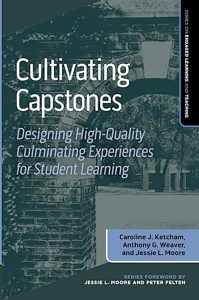From our shelf
A selection of publications by Elon experts on innovative teaching methods
 Cultivating Capstones: Designing High-Quality Culminating Experiences for Student Learning
Cultivating Capstones: Designing High-Quality Culminating Experiences for Student Learning
Edited by Caroline J. Ketcham, Anthony G. Weaver & Jessie L. Moore (2023)
In this edited collection, professors Caroline Ketcham (exercise science), Tony Weaver (sport management) and Jessie Moore (English) introduce higher education faculty and administrators to the landscape of capstone experiences, offer research-informed models that institutions could adapt for their own contextual goals and suggest faculty development strategies to support implementation of high-quality student learning experiences. The collection draws primarily from multi-year, multi-institutional and mixed-methods studies conducted by participants in Elon University’s Center for Engaged Learning research seminar on Capstone Experiences from 2018 to 2020.
 Innovations in Learning: The Professional Nursing Project
Innovations in Learning: The Professional Nursing Project
DeBrew, J. & Lindsey, K. Nursing Education Perspectives. (May 9, 2023).
Jacqueline DeBrew (nursing) and Karen Lindsey (strategic communications) outline how they teamed up to develop an innovative assignment that engaged nursing students throughout the semester and provided a foundation for their practice as professional nurses.
 Teaching Civic Engagement through an Op-Ed Writing Assignment
Teaching Civic Engagement through an Op-Ed Writing Assignment
Ghoshal, R. (2023). Teaching Sociology, 51(2), 161-169.
Raj Ghoshal (sociology) demonstrates that assigning students to write op-eds on course-related issues enhances their understanding of op-ed structure, deepens engagement with course topics and prompts real-world application of learning. Ghoshal offers modifications for wider course applications.
 Empathy Through Data?: Student Exploration of Elements of Diversity through Projects in an Introductory Statistics Course
Empathy Through Data?: Student Exploration of Elements of Diversity through Projects in an Introductory Statistics Course
Doehler, K. & Taylor, L. (2023). Problems, Resources, and Issues in Mathematics Undergraduate Studies, 34(2), 182-203.
Kirstie Doehler and Laura Taylor (statistics) investigate the integration of a multipart project in an introductory statistics course, employing socioeconomic data to deepen student comprehension of diverse lived experiences. Their research underscores the significance of incorporating diversity elements into curriculum, emphasizing the pivotal role of data in shaping our worldview.
 Mentoring Undergraduate Research in Global Contexts (MUR-GC): An Integrated Model
Mentoring Undergraduate Research in Global Contexts (MUR-GC): An Integrated Model
Cruz, L.,Vandermaas-Peeler, M., Hall, E. E., Allocco, A. L., Patch, K., Hamel, J., & McLaughlin, J. (2023). New Directions for Teaching and Learning, 2023(175), 29-39.
Pennsylvania State University’s Laura Cruz and Jacqueline McLaughlin; Elon University’s Amy Allocco, Eric Hall, Jennifer Hamel and Maureen Vandermaas-Peeler; and Grinnell College’s Kate Patch share the findings from a nationwide survey on how higher education institutions in the U.S. are supporting the practice of mentoring undergraduate research in global contexts.
 Do We Need to Write? Researching Perceptions of Disciplinary Writing Importance and Skills in an Advanced Computer Science Course
Do We Need to Write? Researching Perceptions of Disciplinary Writing Importance and Skills in an Advanced Computer Science Course
von Briesen, E. (2023). Journal of Computing Science in Colleges, 39(5), 119–128.
Elizabeth von Briesen’s study in an AI course explores students’ perceptions of writing in computer science. While no significant differences were found between the start and end of term, students recognized writing in the field to be important and expressed interest in further curriculum enhancements.
 Teaching the Introductory Microeconomics Course with Social Media
Teaching the Introductory Microeconomics Course with Social Media
Al-Bahrani, A., Patel, D. & Sheridan, B. (Jan. 2023). Teaching Principles of Microeconomics, Chapter 16, 230-244.
Economics faculty Abdullah Al-Bahrani (Northern Kentucky University), Darshak Patel (University of Kentucky) and Brandon Sheridan (Elon University) explore the integration of popular social media platforms in microeconomic courses, detailing motivations, suitable platforms and teaching strategies. They also provide guidance on effectively leveraging social media in teaching while navigating potential challenges.
